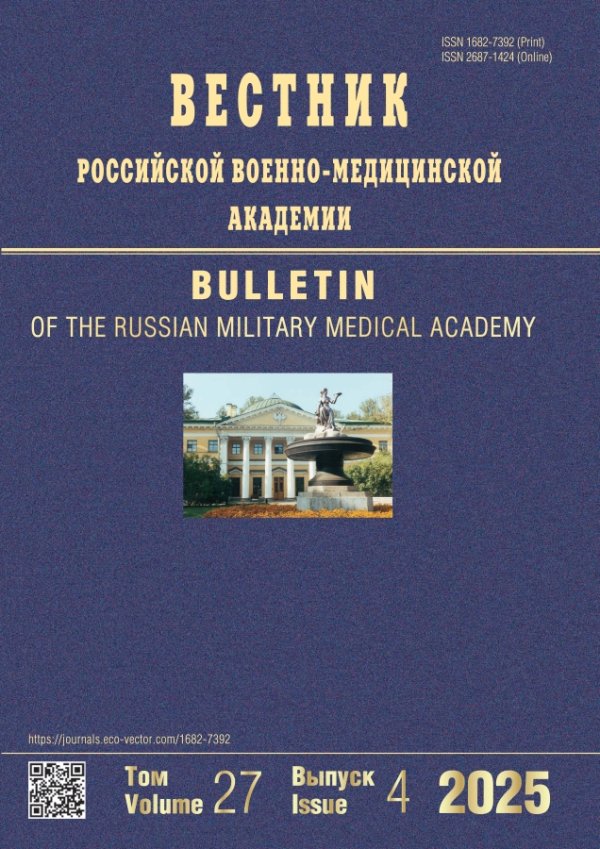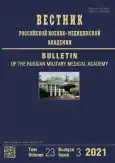Special aspects of intensive care of patients with complicated diverticulosis of the colon
- Authors: Shah B.N.1, Abdulaev M.A.2, Avdeev A.M.2, Strukov E.Y.3, Shchegolev A.V.3, Volchkov V.A.1
-
Affiliations:
- Saint Petersburg State University
- Alexandrovskaya Hospital
- Military Medical Academy named after S.M. Kirov of the Ministry of Defense of the Russian Federation
- Issue: Vol 23, No 3 (2021)
- Pages: 149-156
- Section: Clinical trials
- URL: https://journals.rcsi.science/1682-7392/article/view/79633
- DOI: https://doi.org/10.17816/brmma79633
- ID: 79633
Cite item
Abstract
This study presented examination and treatment results of 129 patients with bleeding from the lower gastrointestinal tract who were treated at the Alexandrovskaya Hospital of St. Petersburg in the period from 2012 to 2017. Examination and treatment were performed in the intensive care unit following current clinical guidelines, taking into account the identified concomitant diseases. Endoscopic examination of the colon is the main diagnostic method for the pathological processes that caused bleeding from the lower gastrointestinal tract. Conservative therapy has been demonstrated effectiveness, and urgent surgical treatment was not needed. The main drug therapy included antifibrinolytic drugs and fresh-frozen plasma preparations. Continuous parenteral administration of proteolysis inhibitors was mandatory. Intensive therapy included correction of hemodynamic disturbances and respiratory failure and restoration of the volume of the circulating blood and plasma. Such an approach was found to be 90% effective. In patients with diverticular disease, bleeding from the colonic diverticula develops in one-third of cases. However, if additional risk factors are present, their frequency reaches 50%, often causing death. Continuous or recurrent bleeding is an indication of surgery. In our study, the conservative method of stopping bleeding from the colonic diverticula was possible in all cases. In general, the disease correlated with the age of the patients. In 68 (53%) patients, bleeding occurred despite anticoagulant or antiplatelet therapy. Patients with bleeding from colonic diverticula do not require urgent surgical intervention, and these patients may require admission to the intensive care unit. Intensive care should include the provision of antifibrinolytic drugs, proteolysis inhibitors, and fresh-frozen plasma.
Full Text
##article.viewOnOriginalSite##About the authors
Boris N. Shah
Saint Petersburg State University
Email: shahboris@rambler.ru
ORCID iD: 0000-0002-8389-7516
SPIN-code: 8352-5270
doctor of medical sciences, senior researcher
Russian Federation, Saint PetersburgMagomed A. Abdulaev
Alexandrovskaya Hospital
Email: e.strukov@mail.ru
doctor of medical sciences, professor
Russian Federation, Saint PetersburgAleksey M. Avdeev
Alexandrovskaya Hospital
Email: e.strukov@mail.ru
SPIN-code: 5238-0830
сandidate of medical sciences
Russian Federation, Saint PetersburgEgor Yu. Strukov
Military Medical Academy named after S.M. Kirov of the Ministry of Defense of the Russian Federation
Author for correspondence.
Email: e.strukov@mail.ru
ORCID iD: 0000-0001-5041-1201
SPIN-code: 3949-3704
doctor of medical sciences
Russian Federation, Saint PetersburgAleksey V. Shchegolev
Military Medical Academy named after S.M. Kirov of the Ministry of Defense of the Russian Federation
Email: alekseischegolev@gmail.com
ORCID iD: 0000-0001-6431-439X
SPIN-code: 4107-6860
Scopus Author ID: 7003338841
ResearcherId: J-4326-2013
doctor of medical sciences, professor
Russian Federation, Saint PetersburgVladimir A. Volchkov
Saint Petersburg State University
Email: volchkovva@mail.ru
ORCID iD: 0000-0002-5664-7386
SPIN-code: 4133-5028
Scopus Author ID: 7006247844
ResearcherId: G-7279-2015
doctor of medical sciences, professor
Russian Federation, Saint PetersburgReferences
- Adams JB, Margolin DA. Management of diverticular hemorrhage. Clin Colon Rectal Surg. 2009;22(3):181–185. doi: 10.1055/s-0029-1236163
- Comparato G, Fanigliulo L, Caballaro LG, et al. Prevention of complications and symptomatic recurrences in diverticular disease with mesalazine: a 12 month follow-up. Dig Dis Sci. 2007;52(11):2934–2941. doi: 10.1007/s10620-007-9766-8
- Fingerhut A, Veyrie N. Complicated diverticular disease. The changing paradigm for treatment. Rev Col Bras Cir. 2012;39(4): 322–327. doi: 10.1590/S0100-69912012000400013
- Hussain A, Mahmood H, Subhas G, El-Hasani S. Complicated diverticular disease of the colon, do we need to change the classical approach, a retrospective study of 110 patients in southeast England. World J Emerg Surg. 2008;3:5. doi: 10.1186/1749-7922-3-5
- Strate LL, Ayanian JZ, Kotler G, Syngal S. Risk factors for mortality in lower intestinal bleeding. Clin Gastroenterol Hepatol. 2008;6(9):1004–1955. doi: 10.1016/j.cgh.2008.03.021
- Niikura R, Nagata N, Akiyama J, et al. Hypertension and concomitant arteriosclerotic diseases are risk factors for colonic diverticular bleeding: a case-control study. Int J Colorectal Dis. 2012:27(9):1137–1143. doi: 10.1007/s00384-012-1422-x
- Okamoto T, Watabe H, Yamada A. The association between arteriosclerosis related diseases and diverticular bleeding. Int J Colorectal Dis. 2012;27(9):1161–1166. doi: 10.1007/s00384-012-1491-x
- Jansen A, Hatenberg S, Grenova U, Elsing Ch. Risk factors for colonic diverticular bleeding: a westernized community based hospital study. World J Gastroenterol. 2009;15(4):457–461. doi: 10.3748/wjg.15.457
- Ríos A, Montoya MJ, Rodriguez JM, et al. Acute lower gastrointestinal hemorrhages in geriatric patients. Dig Dis Sci. 2005;50(5):898–904. doi: 10.1007/s10620-005-2662-1
- Rockey DC. Lower gastrointestinal bleeding. Gastroenterology. 2006;130(1):165–171. doi: 10.1053/j.gastro.2005.11.042
- Stollman N. Efficacy of delayed-release mesalamine in the prevention of GI symptoms following acute diverticulitis — results of the DIVA trial. Am J Gastroenterol. 2010;105:S139.
- Bass BL. Acute gastrointestinal hemorrhage. In: Sabiston Textbook of Surgery. The Biological Basis of Modern Surgical Practice. 17th ed. Philadelphia: Saunders; 2004. P. 1241–1264.
- Farrell JJ, Graeme-Cook F, Kelsey PB. Treatment of Bleeding Colonic Diverticula by Endoscopic Band Ligation: an In-Vivo and Ex-Vivo Pilot Study. Endoscopy. 2003;35(10):823–829. doi: 10.1055/s-2003-42611
- Kim HS, Kim TI, Kim WH. Risk factors for immediate postpolypectomy bleeding of the colon: a multicenter study. Am J Gastroenterol. 2006;101(6)1333–1341. doi: 10.1111/j.1572-0241.2006.00638.x
- Rossetti A, Buchs NC, Breguet R, et al. Transarterial embolization in acute colonic bleeding: review of 11 years of experience and long-term results. Int J Colorectal Dis. 2013;28(6):777–782. doi: 10.1007/s00384-012-1621-5
- Medina C,Vilaseca J, Videla S, et al. Outcome of patients with ischemic colitis: review of fifty-three cases. Dis Colon Rectum. 2004;47(2):180–184. doi: 10.1007/s10350-003-0033-6
- Ishii N, Hirata N, Omata F, et al. Location in the ascending colon is a predictor of refractory colonic diverticular hemorrhage after endoscopic clipping. Gastrointestinal Endoscopy. 2012;76(6): 1175–1181. doi: 10.1016/g.jie.2012.07.040
- Brandt LJ, Boley SJ, Mitsudo S. Clinical characteristics and natural history of colitis in the elderly. Am J Gastroenterol. 1982;77(6):382–386.
- Peery AF, Sandler RS. Diverticular Disease: Reconsidering Conventional Wisdom. Clin Gastroenterol Hepatol. 2013;11(12): 1532–1537. doi: 10.1016/j.cgh.2013.04.048
- Bloomfeld RS, Rockey DC, Shetzline MA. Endoscopic therapy of acute diverticular hemorrhage. Am J Gastroenterol. 2001;96(8):2367–2372. doi: 10.1111/g.1572-0241.2001.04048.x
- Onnitsev IE, Bugaev SA, Ivanusa SYa, et al. Prevention of reccurent bleeding from varicjse veins of the esophagus and stomach among patients with decompensated liver cirrhosis. Kazan Medical Journal. 2019;100(2):333–339. (In Russ.). doi: 10.17816/KMG2019-333
- Green BT, Rockey DC, Portwood G, et al. Urgent colonoscopy for evaluation and management of acute lower gastrointestinal hemorrhage: a randomized controlled trial. Am J Gastroenterol. 2005;100(11):2395–2402. doi: 10.1111/j.1572-0241.2005.00306.x
- Suzuki K, Uchiyama Sh, Imajyo K, et al. Risk factors for colonic diverticular hemorrhage: Japanese multicenter study. Digestion. 2012;85(4):261–265. doi: 10.1159/000336351
- Young-Fadok TM, Roberts PL, Spencer MP, Wolf BG. Colonic diverticular disease. Curr Prob Surg. 2000;37(7):457–514. doi: 10.1016/s0011-3840(00)80011-8
- Chaudhry V, Hyser MG, Gracias VH, Gau FC. Colonoscopy: the initial test for acute lower gastrointestinal bleeding. Am Surg. 1998;64(8):723–728.
- Yen EF, Ladabaum U, Muthusami VR, et al. Colonoscopic treatment of acute diverticular hemorrhage using endoclips. Dig Dis Sci. 2008;53(9):2480–2485. doi: 10.1007/s10620-007-0151-4
- Soltes M. Managing Complicated Diverticular Disease. EMJ Gastroenterol. 2014;3:103–108.
- Khanna A, Ognibene SJ, Koniaris LG. Embolization as first-line therapy for diverticulosis related massive lower gastrointestinal bleeding: evidence from a meta analysis. J Gastrointest Surg. 2005:9(3):343–352. doi: 10.1016/j.gassur.2004.09.039
- Kwan V, Bourke VJ, Williams SJ, et al. Argon plasma coagulation in the management of symptomatic gastrointestinal vascular lesions: experience in 100 consecutive patients with long-term follow-up. Am J Gastroenterol. 2006;101(1):58–63. doi: 10.1111/j.1572-0241.2006.00370.x
- Pilichos C, Pilichos C, Bobotis E. Role of endoscopy in the management of acute diverticular bleeding. World J Gastroenterol. 2008;14(13):1981–1983. doi: 10.3748/wjg.14.1981
- Bender JS, Wiencek RG, Bouwman DL. Morbidity and mortality following total abdominal colectomy for massive lower gastrointestinal bleeding. Am Surg. 1991;57(8):536–540; [discussion] 540–541.
- Andress HJ, Mewes A, Lange V. Endoscopic hemostasis of a bleeding diverticulum of the sigma (sic) with fibrin sealant. Endoscopy. 1993;25(2):193. doi: 10.1055/s-2007-1010286
- Browder W, Cerise EJ, Litwin MS. Impact of emergency angiography in massive lower gastrointestinal bleeding. Ann Surg. 1986;204(5):530–536. doi: 10.1097/00000658-198611000-00004
- Chen CY, Chang-Chieh Wu, Shu-Wen Jao, et al. Colonic diverticular bleeding with comorbid diseases may need elective colectomy. J Gastrointest Surg. 2009;13(3):516–520. doi: 10.1007/s11605-008-0731-4
- Sahin VT, Kryukov EV, Rukavicy OA. Anemiya hronicheskih zabolevanij — osobennosti patogeneza i popytka klassifikacii. Pacific Medical Journal. 2019;(1):33–37. (In Russ.). doi: 10.17238/PmJ1609-1175.2019.1.33-37
Supplementary files








